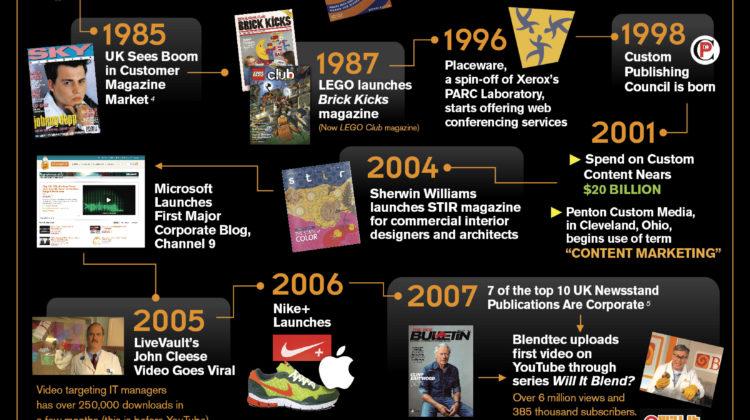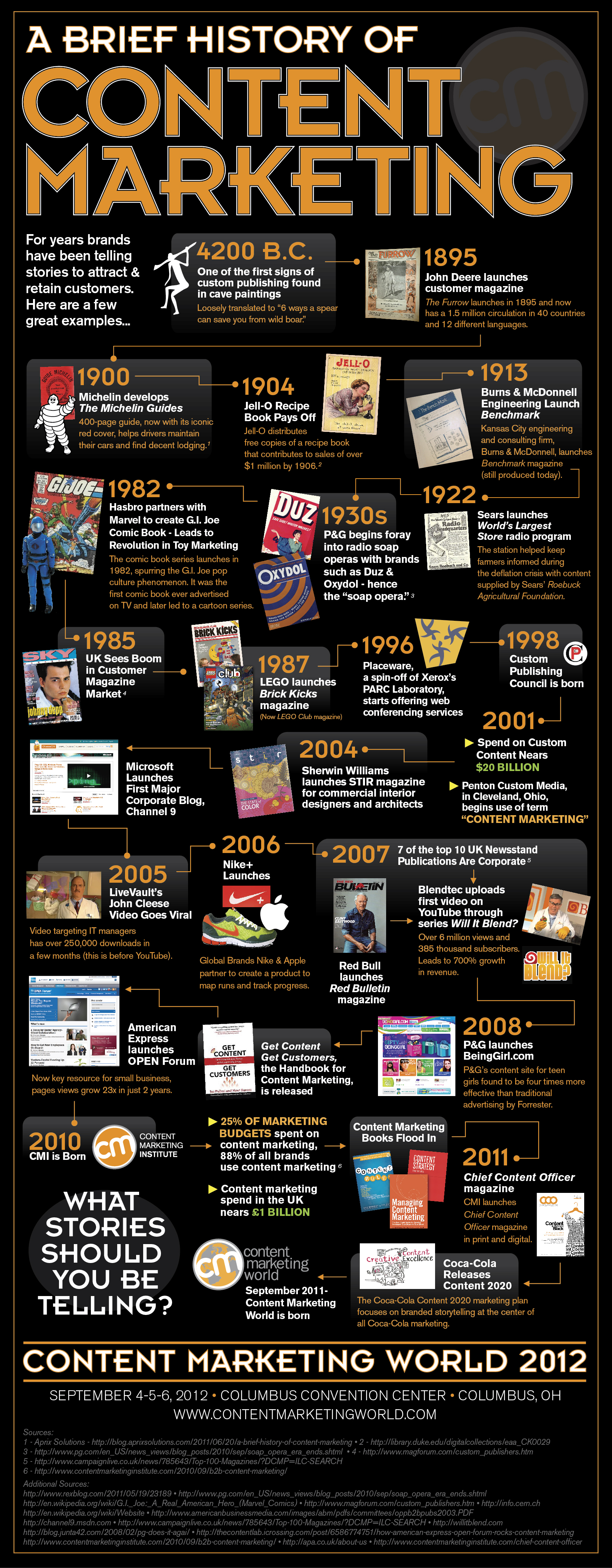
This content marketing infographic by Junta42 highlights important moments in the history of content marketing, beginning at 42 B.C. with a translation of a cave drawing, and jumping to 1895, with John Deere’s launch of its first customer magazine. Before we start to review the history of content marketing from 1895 to present day, let’s review a few content marketing basics.
What is Content Marketing?
Content marketing is centered around the concept of providing valuable information to current and potential customers in order to positively influence their purchasing decisions and behavior. A few traditional examples from the content marketing infographic include the publication and distribution of guides, books, and catalogs.
Content Marketing Definition
Content marketing can be defined as the development, publication, and distribution of valuable content across a variety of mediums and channels to positively influence consumer purchasing decisions.
Web Content Marketing
With the widespread use of search engines, social media and social networking sites over the last few years, content marketing has seen a resurgence in popularity.
Web based content marketing applies traditional content marketing strategies to online marketing channels. A few of the more popular web based content marketing channels include:
- Social Media Sites
- Social Networking Sites
- News Aggregators
- Blogs
Web Content Marketing vs Traditional Content Marketing
Web based content marketing strategies tend to have a higher return on investment than traditional strategies. Traditional content marketing strategies tend to be dependent on publishing physical products and paying to distribute them directly to consumers. This can get very expensive when a company wants to reach tens to hundreds of thousands of consumers, let alone millions. By taking the same content and distributing it online, companies can eliminate some of the biggest expenses associated with content marketing.
Examples of Traditional Content Marketing
- Guide Books
- Print Catalogs
- Books and Magazines
Examples of Web Content Marketing
- Social Media Marketing
- Blogging
- Free E-Books
- Micro-Social Networks
- Email Newsletters
History of Content Marketing
The history of content marketing dates back thousands of years according to the information in this infographic. Historic examples of early content marketing can be seen in caves inhabited by people thousands of years ago. Many of these caves have writings that depict a specific product, such as a spear, highlighting the benefits it provides for hunting and protection.
Print Content Marketing
During the industrial revolution, content marketing became a common marketing strategy. Companies produced a variety of different content products that they distributed and sold to consumers. These products included extensive guides, books, and consumer oriented magazines.
Print Examples from Content Marketing Infographic
- Michelin Guide – Year: 19 – 4 pages covering car maintenance and lodging
- Jell-O Recipes Books – Year: 194 – Recipe book did over one million in sales by 196
- Benchmark – Year: 1913 – Burns and McDonnell Engineering launched industry magazine
Radio and TV Content Marketing
With the advent of radio and television, content marketing became intertwined with storytelling. Companies began producing radio and television shows that helped to create demand for their products and strengthen brand loyalty.
Radio and Tv Examples from Content Marketing Infographic
- Sears Radio – Year: 1922 – Launched largest store radio program
- Procter and Gamble – Year: 193 – Launched radio soap operas with various brands
Web Based Content Marketing
It was not until the 21st century that online content marketing came into its own. Over the last few years, web based content marketing has become one of the most cost effective marketing channels available.
Web Examples
- Microsoft – 24 – Launches first major corporate blog
- Red Bull – 27 – Launches Red Bull Magazine
- American Express – 28 – Launches branded web property Open Forum for business owners
Billions of consumers are online, using social media sites, and interacting with friends and family on social networks. With the widespread use of the web, it is no wonder that 92% of purchasing decisions start with a search engine query. By publishing content online, companies can improve their search engine ranking, and visibility to consumers.
When combined with the power of sharing on social networks, web based content marketing can be very effective. So effective that companies, even those in the B2B space, are increasing their investment in content marketing. Specific trends in content marketing include a focus on article posting, social media and blogs.
Another important aspect of content marketing on the web is dealing with negative feedback on social media sites. With 9% of people making purchasing decisions based on reviews by friends, it is important to have a plan for dealing with positive and negative reviews on social media.
Content Marketing in a Digital World
Over the last few years companies have started to enjoy the benefits of web based content marketing. As more companies integrate content marketing into their online strategy, expect to see an increase in branded web properties offered by companies looking to establish a direct content marketing channel with consumers that is not dependent on social network sites like Facebook and Twitter.
Infographic courtesy of Junta42.

